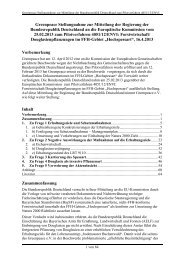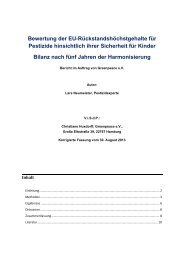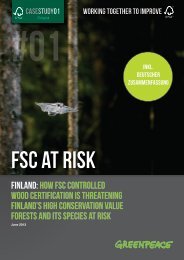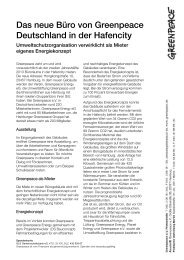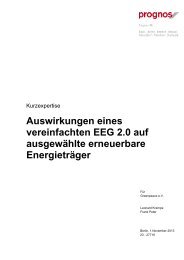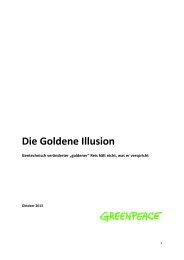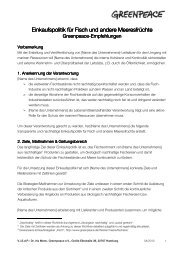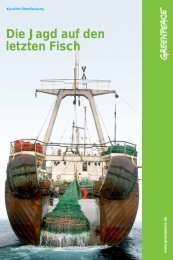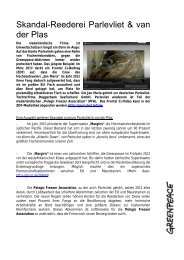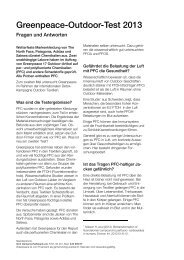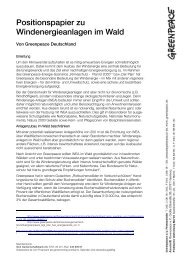Untitled - Greenpeace
Untitled - Greenpeace
Untitled - Greenpeace
You also want an ePaper? Increase the reach of your titles
YUMPU automatically turns print PDFs into web optimized ePapers that Google loves.
CARVING UP THE CONGO 3<br />
©<strong>Greenpeace</strong>/Davison<br />
remapping, exchange, adjustments and<br />
relocations of old titles, as well as out-andout<br />
new allocations.<br />
In a context of corruption and poor governance<br />
in the DRC, the World Bank’s attempts to<br />
reform the forestry sector are currently failing<br />
to control the expansion of logging.<br />
The World Bank’s latest attempt to control the<br />
expansion of the logging industry is a so-called<br />
legal review of titles. 156 logging contracts<br />
covering 21 million hectares of rainforest are<br />
currently being assessed against compliance<br />
with some basic legal criteria.<br />
<strong>Greenpeace</strong> has investigated the actions<br />
of most of the major logging companies<br />
whose contracts have been submitted to the<br />
legal review. Our findings expose serious<br />
lapses of governance, a massive lack of<br />
institutional capacity to control the forestry<br />
sector, widespread illegalities and social<br />
conflicts, as well as clashes with established<br />
conservation initiatives. As this report<br />
reveals, foreign companies including Danzer<br />
group (Siforco), ITB, the NST group (CFT,<br />
Forabola, Sodefor, Soforma), Olam, Sicobois<br />
and Trans-M have all had new contracts<br />
signed after the May 2002 moratorium. The<br />
majority have therefore benefited from the<br />
World Bank’s failure to ensure that the<br />
moratorium it negotiated with the transitional<br />
DRC government and other forestry sector<br />
reforms have been enforced.<br />
<strong>Greenpeace</strong> fears that the legal review could<br />
become an exercise in laundering illegal<br />
contracts. Do the World Bank and the DRC<br />
Government have the political will to crack<br />
down on those who have benefited from<br />
such corruption?<br />
A review of the 156 contracts under<br />
review – <strong>Greenpeace</strong>’s key findings:<br />
107 out of 156 contracts were signed after<br />
the May 2002 moratorium. Only 40 of those<br />
signed prior to the moratorium appear to have<br />
paid their area tax in 2004 (tax payment being<br />
a criterion of the legal review, 2004 is the only<br />
year for which government data, however<br />
inaccurate, is publicly available).<br />
Nearly half of the 156 titles are in intact forest<br />
landscapes – critical for carbon storage and<br />
very significant for wildlife protection.<br />
Because comprehensive maps are not publicly<br />
available, the location of 13 contracts covering<br />
1.7 million hectares (an area the size of<br />
Kuwait) cannot be determined.<br />
All the contracts are in areas inhabited by<br />
forest-dependent communities; two-thirds



